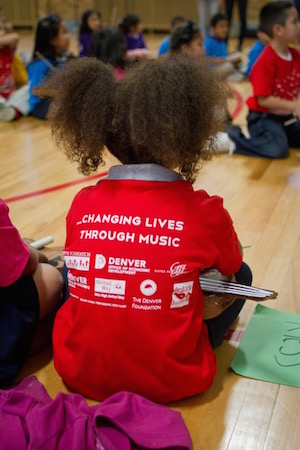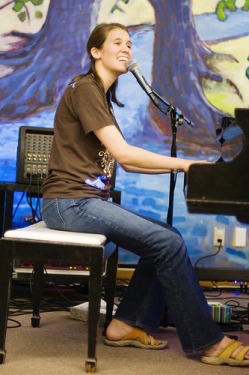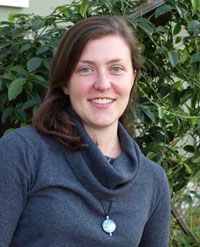El Sistema is a global approach using music education to transform lives and bring about social change. In El Sistema-inspired programs, children as young as age 2 and living in impoverished and sometimes dangerous situations are offered intensive music training.
The results have been nothing short of miraculous in many situations. Children learn to play music in an ensemble-based program. Their training includes instruction on an instrument, basic musicianship, and improvisation and composition.
Founded in Venezuela in 1975 by the late economist and musician José Antonio Abreu, El Sistema programs are found in more than 55 countries including the U.S. In addition to gaining the ability to play an instrument and perform in an ensemble, participants have shown measurable gains in academic performance, as well as improvement in school attendance and behavior both inside and outside the classroom.
El Sistema Colorado’s Jamie Wolf, program director, and Megan Moran, former lead teaching artist, spoke with MajoringInMusic.com about the benefits and challenges of their work with El Sistema.
What drew you to start teaching with El Sistema Colorado?
Jamie Wolf: In college, I was continually frustrated with the lack of connection between the music school and the outside world. It baffled me that students would spend hours alone in a practice room, rarely taking that talent out and sharing it for the good of others. I had a growing passion to work with the underserved, and a deep-seated belief in the power of music to make a real difference in people’s lives. Throughout my undergrad, I sought out ways to make that connection myself and provide other students with opportunities to experience that kind of work as well. Working as an Americorps volunteer with a non-profit school reform organization at a low-income school the year after I graduated solidified my desire to make music and social change part of my career as a choral director.
Megan Moran: I originally found out about Sistema in my work with afterschool programming in Portland, OR. I was working with a program that had kids coming in an hour or two a week and I was curious what could happen if there was more intensity. I looked into El Sistema and was accepted into the Abreu Fellowship at the New England Conservatory.*
The biggest thing that drew me to Colorado is that it was so easy to jump in and work with the team. Everybody had a lot of good energy and the kids seemed fun to work with.
What are some of the benefits of your work? What are some of the things you’ve learned?
Jamie: I feel so lucky to have a job that I love – even on the hard days! It feels great to be doing meaningful work that challenges me to be a better teacher, musician, and human being every day. Working with low-income students is where I feel called to be right now, and I love giving them the opportunity to discover a talent they might never have had the chance to realize. I learn so many things every day!
Megan: I’ve learned a lot about myself personally and as a teacher, and the kids challenged me every day –– which I appreciated! The students all brought their own stories, imagination, experiences, and excitement –– and that’s really contagious. It’s exciting to see where these kids can go.
What are some of the challenges anyone thinking about working with El Sistema should know about?
Jamie: Although I’ve been teaching for quite a few years, and majored in music education, I am pushed to the limits of my teaching skills every single day with my kids. Classroom management is a continuous challenge. Like many non-profit jobs, a job with an El Sistema-inspired program also usually means working really hard for very modest compensation.
Megan: It’s a big time and energy commitment. There’s not a lot of precedent for the work we’re doing and the way that we were doing it in the United States. Finding what works within one’s own community can be a challenge because what works in Venezuela or what works in Boston may not work in Denver.
What kind of special training did you need for this work?
Jamie: I was grateful to be accepted into an internship at Northwestern University called “Partnerships through the Arts” where I got to work with Chicago public schools and professional teaching artists.
Some friends and I started a student group called the Music Learning Community which included an initiative to partner with a local church to give free private music lessons to community members who couldn’t afford afford them. Through concerted effort, I got a student teaching placement in an inner city high school (rather than in the more affluent suburbs as was the general practice). After college I taught in many different settings and at a few Title 1 (low-income) schools.
Megan: During the Abreu Fellowship, most relevant was my residency at another El Sistema-inspired program in Juneau, Alaska. The Fellowship program was focused on running a non-profit –– the strategic planning and budget side of things –– which was helpful in gaining the bigger picture of how all the pieces fit together. Seeing lots of different kinds of teaching and learning different group pedagogy was also helpful.
Another aspect of training for working with an El Sistema program is classroom management plus an awareness of the population and culture you’ll be working with –– and how that may differ from your own background and set of experiences.
Can you do this work and still perform and/or teach privately?
Jamie: Most of our staff at El Sistema Colorado are part-time, which means most are also teaching privately and working as professional gigging musicians around the city. That is part of what makes the teaching artist role powerful with kids –– they have mentors who can inspire them with what it is like in the real world as a musician.
Megan: I think it is definitely possible. It’s what makes Sistema unique. You’re often dealing with teaching artists rather than trained music teachers. They are active artists in addition to their roles as teachers. There can be drawbacks but there are also positives.
What are El Sistema programs looking for in teaching artist applicants?
Jamie: I am always looking for people who are passionate about the bigger vision and mission of El Sistema: to change lives and communities through music. Our teaching artists need to have experience working with groups of children and be masters of their instruments. They need to be flexible, collaborative, and naturally take initiative. People who are bilingual (in the language of the students we work with) are a huge asset.
Megan: Dedication and commitment. Somebody who is not only going to be invested in the musical progress of their students but their entire well-being. Somebody who has a passion for what they do because that will be communicated to the students. Prior teaching experience in a group setting is important. Some familiarity with pedagogy within one’s instrument is also important.
* The Sistema Fellows Program was a post-graduate certificate initiative offered by New England Conservatory from 2010-14. Through master classes, workshops, internships and residencies, participants received the training needed to start El Sistema programs throughout the U.S. and other countries.





Stanford Thompson
We post jobs from around the country on our Job Bank on the El Sistema USA website. Visit our website for listings and more information: http://www.elsistemausa.org/jobs.htm